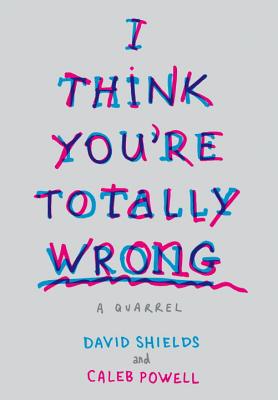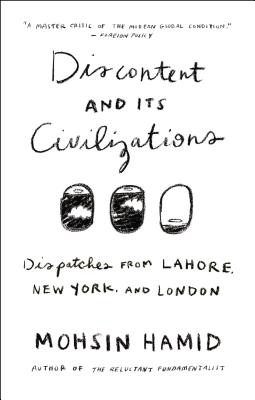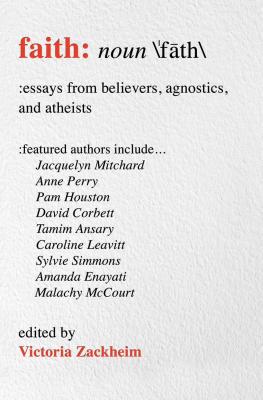An impassioned, funny, probing, fiercely inconclusive, nearly-to-the-death debate about life and art—beers included.
Caleb Powell always wanted to become an artist, but he overcommitted to life (he’s a stay-at-home dad to three young girls), whereas his former professor David Shields always wanted to become a human being, but he overcommitted to art (he has five books coming out in the next year and a half). Shields and Powell spend four days together at a cabin in the Cascade Mountains, playing chess, shooting hoops, hiking to lakes and an abandoned mine; they rewatch "My Dinner with André" and "The Trip", relax in a hot tub, and talk about everything they can think of in the name of exploring and debating their central question (life and/or art?): marriage, family, sports, sex, happiness, drugs, death, betrayal—and, of course, writers and writing.
The relationship—the balance of power—between Shields and Powell is in constant flux, as two egos try to undermine each other, two personalities overlap and collapse. This book seeks to deconstruct the Q&A format, which has roots as deep as Plato and Socrates and as wide as Laurel and Hardy, Beckett’s Didi and Gogo, and "Car Talk’s" Magliozzi brothers. I Think You’re Totally Wrong also seeks to confound, as much as possible, the divisions between “reality” and “fiction,” between “life” and “art.” There are no teachers or students here, no interviewers or interviewees, no masters in the universe—only a chasm of uncertainty, in a dialogue that remains dazzlingly provocative and entertaining from start to finish.
James Franco's adaptation of I Think You're Totally Wrong into a film, with Shields and Powell striving mightily to play themselves and Franco in a supporting role, will be released later this year.
From “one of his generation’s most inventive and gifted writers” (The New York Times), intimate and sharply observed commentary on life, art, politics, and “the war on terror.”
Mohsin Hamid’s brilliant, moving, and extraordinarily clever novels have not only made him an international bestseller, they have earned him a reputation as a “master critic of the modern global condition” (Foreign Policy). His stories are at once timeless and of-the-moment, and his themes are universal: love, language, ambition, power, corruption, religion, family, identity. Here he explores this terrain from a different angle in essays that deftly counterpoise the personal and the political, and are shot through with the same passion, imagination, and breathtaking shifts of perspective that gives his fiction its unmistakable electric charge.
A “water lily” who has called three countries on three continents his home—Pakistan, the birthplace to which he returned as a young father; the United States, where he spent his childhood and young adulthood; and Britain, where he married and became a citizen—Hamid writes about overlapping worlds with fluidity and penetrating insight. Whether he is discussing courtship rituals or pop culture, drones or the rhythms of daily life in an extended family compound, he transports us beyond the scarifying headlines of an anxious West and a volatile East, beyond stereotype and assumption, and helps to bring a dazzling diverse global culture within emotional and intellectual reach.
Delve into this thought-provoking collection of personal essays from award-winning and bestselling authors who explore the perennial question: What do I believe?
Whether believer, skeptic, agnostic, atheist, or something "other," these twenty-four authors share a fascinating, daring, and multifaceted perspective on what faith means (or doesn't mean). The collection of personal essays includes bestselling authors such as Anne Perry, who writes about a deeply spiritual faith that embraces and sustains her through every step of her life. Caroline Leavitt writes about tarot cards, mediums, and quantum physics to explain her concept of faith. Afghan-American author Tamim Ansary beautifully captures his childhood curiosity amidst his Islamic views. There is the irrepressible Malachy McCourt's anti-religion rant, and then Pam Houston's signature wit and sense of irony, which gives the question of faith a surprising twist.
Honest, provocative, and candid, Faith begins a larger conversation and invites the question: What do you believe?
Caleb Powell always wanted to become an artist, but he overcommitted to life (he’s a stay-at-home dad to three young girls), whereas his former professor David Shields always wanted to become a human being, but he overcommitted to art (he has five books coming out in the next year and a half). Shields and Powell spend four days together at a cabin in the Cascade Mountains, playing chess, shooting hoops, hiking to lakes and an abandoned mine; they rewatch "My Dinner with André" and "The Trip", relax in a hot tub, and talk about everything they can think of in the name of exploring and debating their central question (life and/or art?): marriage, family, sports, sex, happiness, drugs, death, betrayal—and, of course, writers and writing.
The relationship—the balance of power—between Shields and Powell is in constant flux, as two egos try to undermine each other, two personalities overlap and collapse. This book seeks to deconstruct the Q&A format, which has roots as deep as Plato and Socrates and as wide as Laurel and Hardy, Beckett’s Didi and Gogo, and "Car Talk’s" Magliozzi brothers. I Think You’re Totally Wrong also seeks to confound, as much as possible, the divisions between “reality” and “fiction,” between “life” and “art.” There are no teachers or students here, no interviewers or interviewees, no masters in the universe—only a chasm of uncertainty, in a dialogue that remains dazzlingly provocative and entertaining from start to finish.
James Franco's adaptation of I Think You're Totally Wrong into a film, with Shields and Powell striving mightily to play themselves and Franco in a supporting role, will be released later this year.
From “one of his generation’s most inventive and gifted writers” (The New York Times), intimate and sharply observed commentary on life, art, politics, and “the war on terror.”
Mohsin Hamid’s brilliant, moving, and extraordinarily clever novels have not only made him an international bestseller, they have earned him a reputation as a “master critic of the modern global condition” (Foreign Policy). His stories are at once timeless and of-the-moment, and his themes are universal: love, language, ambition, power, corruption, religion, family, identity. Here he explores this terrain from a different angle in essays that deftly counterpoise the personal and the political, and are shot through with the same passion, imagination, and breathtaking shifts of perspective that gives his fiction its unmistakable electric charge.
A “water lily” who has called three countries on three continents his home—Pakistan, the birthplace to which he returned as a young father; the United States, where he spent his childhood and young adulthood; and Britain, where he married and became a citizen—Hamid writes about overlapping worlds with fluidity and penetrating insight. Whether he is discussing courtship rituals or pop culture, drones or the rhythms of daily life in an extended family compound, he transports us beyond the scarifying headlines of an anxious West and a volatile East, beyond stereotype and assumption, and helps to bring a dazzling diverse global culture within emotional and intellectual reach.
Delve into this thought-provoking collection of personal essays from award-winning and bestselling authors who explore the perennial question: What do I believe?
Whether believer, skeptic, agnostic, atheist, or something "other," these twenty-four authors share a fascinating, daring, and multifaceted perspective on what faith means (or doesn't mean). The collection of personal essays includes bestselling authors such as Anne Perry, who writes about a deeply spiritual faith that embraces and sustains her through every step of her life. Caroline Leavitt writes about tarot cards, mediums, and quantum physics to explain her concept of faith. Afghan-American author Tamim Ansary beautifully captures his childhood curiosity amidst his Islamic views. There is the irrepressible Malachy McCourt's anti-religion rant, and then Pam Houston's signature wit and sense of irony, which gives the question of faith a surprising twist.
Honest, provocative, and candid, Faith begins a larger conversation and invites the question: What do you believe?



No comments:
Post a Comment